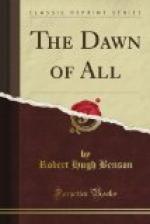“Stay, we’re just there.” (The car wheeled in swiftly under an archway, whisked to the left, and drew up before the cloister door.) “Now, Monsignor, I’m going in to see the Prior myself and give him the papers. You have them?”
“I. . . I don’t know.”
The priest dived forward and extracted a small despatch-box from some unseen receptacle.
“Your keys, please, Monsignor.”
The other felt wildly about his person. He saw the steady eyes of the old priest upon him.
“You keep them in your left-hand breast pocket,” said the priest slowly and distinctly.
The man felt there, fetched out a bundle of thin, flat keys, and handed them over helplessly. While the priest turned them over, examining each, the other stared hopelessly out of the window, past the motionless servant in purple who waited with his hand on the car-door. Surely he knew this place. . . . Yes; it was Dean’s Yard. And this was the entrance to the cloister of the Abbey. But who was “the Prior,” and what was it all about?
He turned to the other, who by now was bending over the box and extracting a few papers laid neatly at the top.
“What are you doing, father? Who are you going to see?”
“I am going to take these papers of yours to the Prior—the Prior of Westminster. The Abbot isn’t here yet. Only a few of the monks have come.”
“Monks! Prior! . . . Father!”
The old man looked him in the eyes again.
“Yes,” he said quietly. “The Abbey was made over again to the Benedictines last year, but they haven’t yet formally taken possession. And these papers concern business connected with the whole affair—the relations of seculars and regulars. I’ll tell you afterwards. I must go in now, and you must just remain here quietly. Tell me again. What is your name? Who are you?”
“I. . . I am Monsignor Masterman. . . secretary
to
Cardinal Bellairs.”
The priest smiled as he laid his hand on the door.
“Quite right,” he said. “Now please sit here quietly, Monsignor, till I come back.”
(III)
He sat in perfect silence, waiting, leaning back in his corner with closed eyes, compelling himself to keep his composure.
It was, at any rate, good luck that he had fallen in with such a friend as this—Father Jervis, was it not?—who knew all about him, and, obviously, could be trusted to be discreet. He must just attend to his instructions quietly then, and do what he was told. No doubt things would come back soon. But how very curious this all was about Hyde Park and Westminster. He could have sworn that England was a Protestant country, and the Church just a tiny fragment of its population. Why, it was only recently that Westminster Cathedral was built—was it not? But then this was the year seventy-three . . . and . . . and he could not remember in what year the Cathedral was built. Then again the horror and bewilderment seized him. He gripped his knees with his hands in an agony of consternation. He would go mad if he could not remember. Or at least——Ah! here was Father Jervis coming back again.




